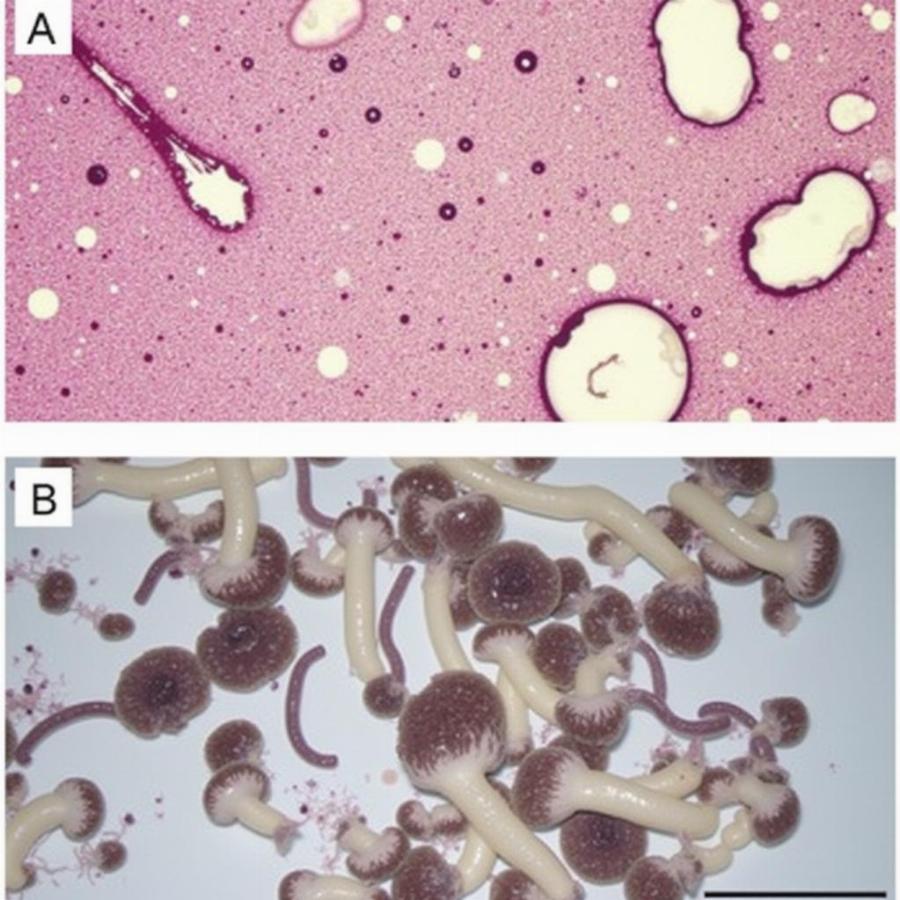Mushroom stool in dogs can be a cause for concern, but it’s not always a sign of something serious. Understanding why your dog might have mushroom-like formations in their stool, and when it’s time to seek veterinary attention, is key to responsible pet ownership. This article will explore the potential causes of mushroom stool in dogs, the symptoms to watch out for, and what you can do to help your furry friend.
Understanding the Causes of Mushroom Stool in Dogs
Several factors can contribute to mushroom-shaped stool in dogs. These range from dietary changes and parasitic infections to more serious underlying health issues. Let’s delve into some of the most common culprits:
Diet and Digestion
Sometimes, a simple change in diet can alter the consistency and shape of your dog’s stool. If you’ve recently switched your dog’s food, it’s possible that their digestive system is still adjusting. Similarly, introducing new treats or table scraps can also lead to temporary changes in stool formation, including the appearance of mushroom-like shapes.
Parasitic Infections
Intestinal parasites, such as whipworms, can cause inflammation and irritation in the gut, leading to changes in stool appearance. Whipworms, in particular, are known to cause mucus-covered stool that can resemble mushrooms.  Dog's stool infected with parasites If you suspect your dog might have worms, it’s crucial to consult your veterinarian for diagnosis and treatment.
Dog's stool infected with parasites If you suspect your dog might have worms, it’s crucial to consult your veterinarian for diagnosis and treatment.
Inflammatory Bowel Disease (IBD)
IBD is a chronic condition that affects the digestive tract, causing inflammation and discomfort. One of the symptoms of IBD can be changes in stool consistency and form, including the occasional mushroom-like appearance.
Other Potential Causes
While less common, other factors like food allergies, stress, and certain medications can also contribute to unusual stool formations in dogs.
Symptoms to Watch For
Mushroom-shaped stool alone isn’t necessarily a cause for alarm. However, if it’s accompanied by other symptoms, it’s essential to seek veterinary attention. These symptoms might include:
- Vomiting
- Diarrhea
- Loss of appetite
- Lethargy
- Weight loss
- Blood in stool
When to Consult Your Veterinarian
If your dog’s mushroom stool persists for more than a few days, or if you notice any of the accompanying symptoms mentioned above, it’s time to consult your veterinarian. best food for dogs with cancer They can perform a thorough examination, including fecal tests, to determine the underlying cause and recommend appropriate treatment.
What You Can Do to Help
While waiting for your veterinary appointment, there are a few things you can do to potentially alleviate your dog’s discomfort:
- Ensure your dog has access to fresh water at all times.
- Offer a bland diet of boiled chicken and rice to help soothe their digestive system.
- Avoid giving your dog any new treats or table scraps.
Could My Dog’s Mushroom Stool Be Caused by Mushrooms They Ate?
While it’s unlikely that the mushrooms your dog ate directly cause mushroom-shaped stool, it’s essential to be aware of the dangers of mushroom toxicity in dogs. how to give dogs turkeytail mushrooms Many wild mushrooms are toxic to dogs and can cause severe illness or even death. If you suspect your dog has ingested a wild mushroom, contact your veterinarian or a pet poison control center immediately.
How Can I Prevent Mushroom Stool in My Dog?
Maintaining a healthy diet, regular deworming, and managing stress can help prevent digestive issues that might contribute to unusual stool formations. mushroom supplements for dogs
Conclusion
Mushroom stool in dogs can be a sign of various underlying issues, from simple dietary changes to more serious health concerns. By paying close attention to your dog’s overall health and seeking veterinary care when necessary, you can ensure their well-being and help them maintain a healthy digestive system. Remember, early diagnosis and treatment are crucial for managing any underlying health problems.
FAQs
- Is mushroom stool always a sign of something serious? No, not always. Dietary changes can sometimes lead to temporary changes in stool formation.
- What should I do if my dog has mushroom stool? Monitor your dog for other symptoms and consult your veterinarian if the issue persists or worsens.
- Can I treat my dog’s mushroom stool at home? It’s best to consult your veterinarian before attempting any home treatments.
- How can I tell if my dog has worms? Symptoms of worms can include changes in stool, vomiting, weight loss, and a pot-bellied appearance.
- Are mushroom supplements safe for dogs? Consult your veterinarian before giving your dog any supplements, including mushroom supplements.